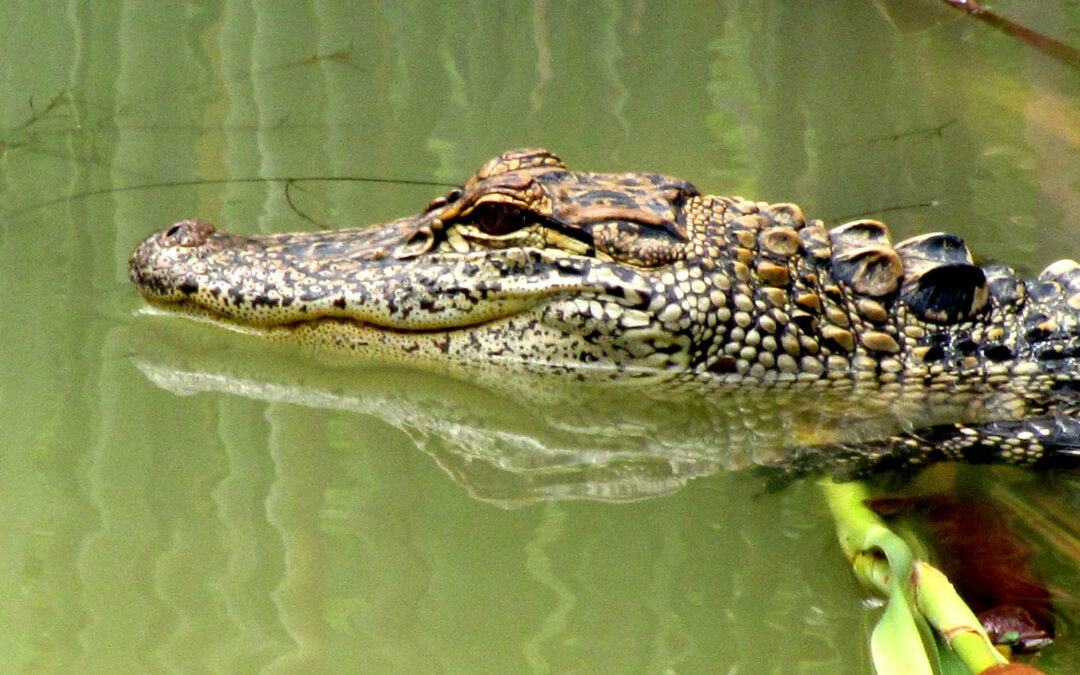How Long Can Alligators Hold Their Breath? At Grape Hammock, you might spot alligators surfacing for air. Generally, alligators can hold their breath underwater for about 15 to 20 minutes. More giant adult alligators can even manage up to 45 minutes submerged.
In colder weather, their breath-holding ability increases. Alligators slow their metabolism to save energy, allowing them to stay underwater for several hours. In rare cases, they can go without air for up to 24 hours. This ability helps them remain hidden from predators or approach prey quietly.
Can Alligators Breathe Underwater?
Alligators cannot breathe underwater because they don’t have gills like fish. Like humans, they must come to the surface to breathe air through their lungs. However, they are well-adapted to water.
Alligators can hold their breath for extended periods by slowing their heart rate and conserving oxygen, enabling them to remain underwater to hunt or hide from threats. Their solid tails and sleek bodies make them powerful swimmers, allowing them to move swiftly and silently through the water.
How Do Alligators Hold Their Breath So Long?
Alligators have several adaptations that help them stay underwater for extended periods:
- Metabolism: Alligators can slow down their metabolism to conserve oxygen. In colder water, this metabolic slowdown becomes even more pronounced, enabling them to stay submerged much longer. This ability is crucial for both hunting and avoiding predators.
- Blood Flow: They have a unique ability to control their blood flow. Alligators ensure that these areas receive the oxygen they need while underwater by directing most of their blood to vital organs like the brain and heart. Their heart rate can slow to 2 or 3 beats per minute, drastically reducing their oxygen demand.
- Lung Efficiency: Unlike mammals, alligator lungs are highly efficient, utilizing a one-way airflow system. This means that air moves in a continuous loop through their lungs, maximizing oxygen absorption. As a result, they can make the most out of each breath they take before diving underwater.
- Anaerobic Respiration: When submerged for extended periods, alligators can switch to anaerobic respiration, producing energy without oxygen. This adaptation gives them an extra burst of energy during long dives, enabling them to stay underwater longer without needing to surface for air.
- Muscle Function: Alligators can continue using their muscles efficiently even when oxygen levels are low. Their muscle tissues can store energy through glycogen, which allows them to function even when oxygen is scarce. This gives them an advantage when stalking prey underwater or escaping threats.
Together, these adaptations make alligators exceptional at surviving in aquatic environments, enhancing their ability to be both efficient hunters and elusive predators.
Can Alligators Drown?
Yes, alligators can drown if they cannot reach the surface to breathe. Even though they are skilled at managing oxygen, they still need to come up for air. If they get trapped or otherwise unable to surface, they can run out of air and drown. This highlights the need for environmental protection to keep their habitats safe.
See Alligators Up Close
Visit Wild Florida for an unforgettable experience with these fantastic creatures. Take an airboat ride to observe alligators in their natural habitat, and then head to Grape Hammock Park for an up-close look at some of our most well-known alligators. Discover Florida’s wild side and make lasting memories.
Our Service Area: Lake Wales, Serbing, Frostproof, Dundee, Bartow, Babson Park, Haines City, Cypress Gardens, Lake Kissimmee, Avon Park, Highland Park, Davenport


